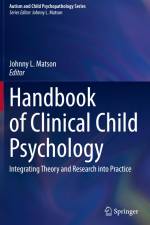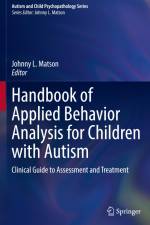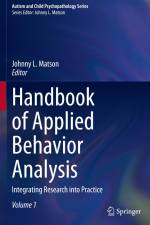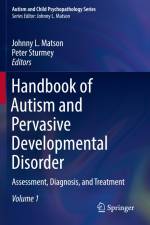von Johnny L. Matson
503,00 €
This book provides comprehensive coverage of applied behavioral analysis (ABA). It examines the history and training methods of ABA as well as related ethical and legal issues. The book discusses various aspects of reinforcement, including social reinforcers, tangible reinforcers, automatic reinforcement, thinning reinforcers, and behavioral momentum. It addresses basic training strategies, such as prompts and fadings, stimulus fading, and stimulus pairing and provides insights into auditory/visual discrimination, instructional feedback, generalization, error correction procedures, and response interruption. In addition, the book addresses the use of ABA in education and explores compliance training, on-task behavior, teaching play and social skills, listening and academic skills, technology, remembering and cognitions, picture-based instruction, foreign language instruction, teaching verbal behavior, public speaking, and vocational skills. In addition, the book covers treatments for tics, trichotillomania, stereotypies, self-injurious behavior, aggression, and toe walking. It also addresses ABA for special populations, including individuals with autism, ADHD, substance abuse, and intellectual disabilities.Featured areas of coverage include:Basic assessment methods, such as observing behavior, treatment integrity, social validation, evaluating physical activity, measuring sleep disturbances, preference assessment, and establishing criteria for skill mastery.Functional assessment, including how to quantify outcomes and evaluate results, behaviors that precede and are linked to target behaviors, and treatments.Treatment methods, such as token economies, discrete trial instruction, protective equipment, group-based and parent training as well as staff training and self-control procedures.Health issues, including dental and self-care, life skills, mealtime and feeding, telehealth, smoking reduction and cessation, and safety training.Leisure and social skills, such as cellphone use, gambling, teaching music, sports and physical fitness.The Handbook of Applied Behavior Analysis is a must-have reference for researchers, professors, and graduate students as well as clinicians, therapists, and other professionals in clinical child and school psychology, child and adolescent psychiatry, social work, behavioral therapy and rehabilitation, special education, developmental psychology, pediatrics, nursing, and all interrelated disciplines.




